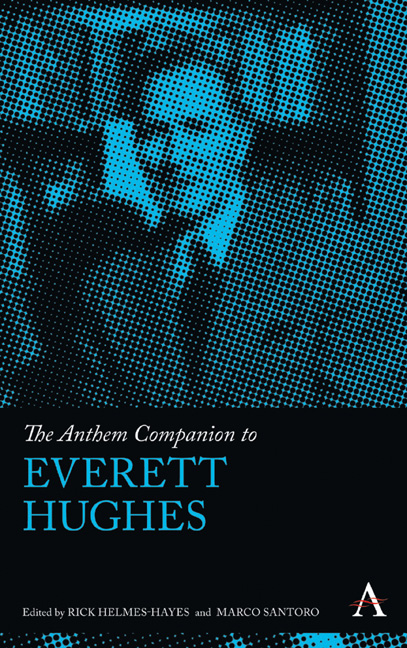Book contents
- Frontmatter
- CONTENTS
- List of Illustrations
- Foreword Everett C. Hughes, Great Teacher
- Insight through Craftsmanship: The Sociological Legacy of Everett Hughes
- Chapter One Everett Hughes and the Chicago Tradition
- Chapter Two Studying “Going Concerns”: Everett C. Hughes on Method
- Chapter Three The Natural History of Everett Cherrington Hughes: A Master of Fieldwork
- Chapter Four Everett C. Hughes: A Key Figure of the Canadian Chicago School Diaspora
- Chapter Five Everett Hughes: Notes from an Apprentice
- Chapter Six An American in Frankfurt: Everett C. Hughes's Unpublished Book on Germans after the End of the Nazi Regime
- Chapter Seven The Origins and Evolution of Everett Hughes's Concept: ‘Master Status’
- Chapter Eight Discovering the Secret of Excellence: Everett Hughes as a Source of Inspiration in Researching Creative Careers
- Chapter Nine Everett Hughes on Race: Wedded to an Antiquated Paradigm
- Notes on Contributors
- Index of Names
- Index of Subjects
Chapter Seven - The Origins and Evolution of Everett Hughes's Concept: ‘Master Status’
Published online by Cambridge University Press: 17 June 2017
- Frontmatter
- CONTENTS
- List of Illustrations
- Foreword Everett C. Hughes, Great Teacher
- Insight through Craftsmanship: The Sociological Legacy of Everett Hughes
- Chapter One Everett Hughes and the Chicago Tradition
- Chapter Two Studying “Going Concerns”: Everett C. Hughes on Method
- Chapter Three The Natural History of Everett Cherrington Hughes: A Master of Fieldwork
- Chapter Four Everett C. Hughes: A Key Figure of the Canadian Chicago School Diaspora
- Chapter Five Everett Hughes: Notes from an Apprentice
- Chapter Six An American in Frankfurt: Everett C. Hughes's Unpublished Book on Germans after the End of the Nazi Regime
- Chapter Seven The Origins and Evolution of Everett Hughes's Concept: ‘Master Status’
- Chapter Eight Discovering the Secret of Excellence: Everett Hughes as a Source of Inspiration in Researching Creative Careers
- Chapter Nine Everett Hughes on Race: Wedded to an Antiquated Paradigm
- Notes on Contributors
- Index of Names
- Index of Subjects
Summary
The concept of ‘master status’, which Hughes presented in his seminal article ‘Dilemmas and Contradictions of Status’ in the American Journal of Sociology(AJS)in 1945, has only gained momentum over the years. It has come to be used in a range of literatures and situations. Although Hughes’ article was immediately influential in the debates of the day around status and roles, the actual term ‘master status’ was not cited regularly until the 1970s, which coincided with the fall of structural-functionalism, increased attention to the inequality of racism and rising academic interest in intersectionality. At that point, the term’ own status increased.
As the academic community turned its focus to race in the late 1960s and 1970s, master status became an ideal term for understanding at least some of the dynamics of race relations. As well, however, sociologists began to apply it to character traits that were incongruent with other traits and problematic in some way, often traits that mainstream people perceive as negative. Through the 1980s, scholars continued to use the term to study race. At the same time, however, the term master status garnered attention from those studying gender. During the 1990s and after, scholars sustained use of this concept in the fields of race and gender and extended it to apply to a myriad of other traits – both visible and invisible.
A Google Scholar web search finds that the literature has cited Hughes’ 1945 article 857 times, with roughly 250 of those citations in languages other than English, about 150 of those in German. We downloaded each of the English articles, along with some of the French and German articles, to Endnote. This amounted to 671 articles, in total, spanning 1946 to 2014. We read 138 of these articles, attending to whether the actual term master status was used, what status trait it referenced (e.g., race, gender, junkie), whether the term was defined explicitly and whether it was used to develop theory. We also read much of the work of Hughes’ students, whether they were cited in our search or not, to ascertain the extent to which Hughes’ article was cited and/or whether the term master status was used. Like Jaworski (2000), we found that many of Hughes’ students did not cite him directly, Howard Becker being the outlier, fittingly as Becker’ studies centre on outliers.
- Type
- Chapter
- Information
- The Anthem Companion to Everett Hughes , pp. 173 - 192Publisher: Anthem PressPrint publication year: 2016



